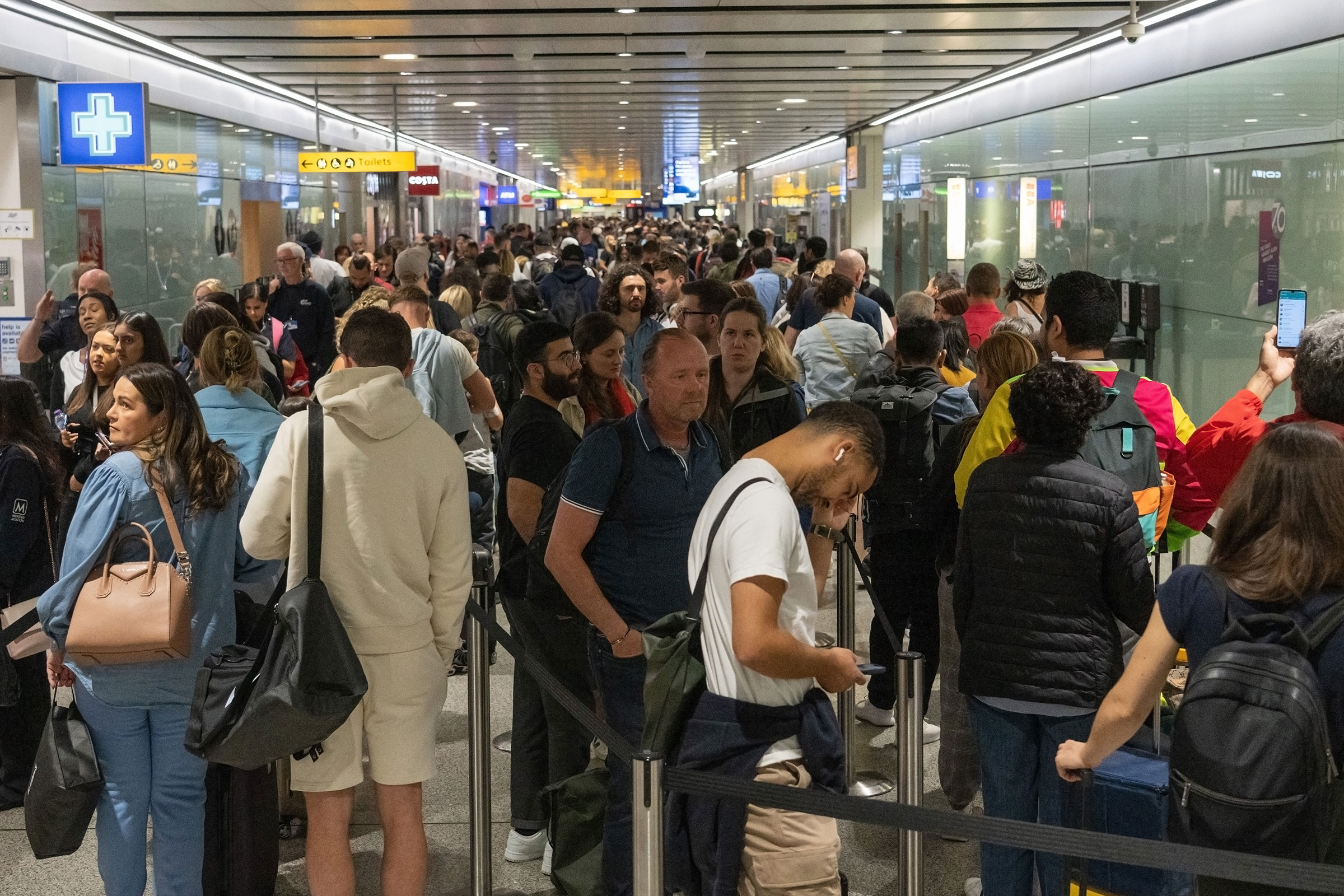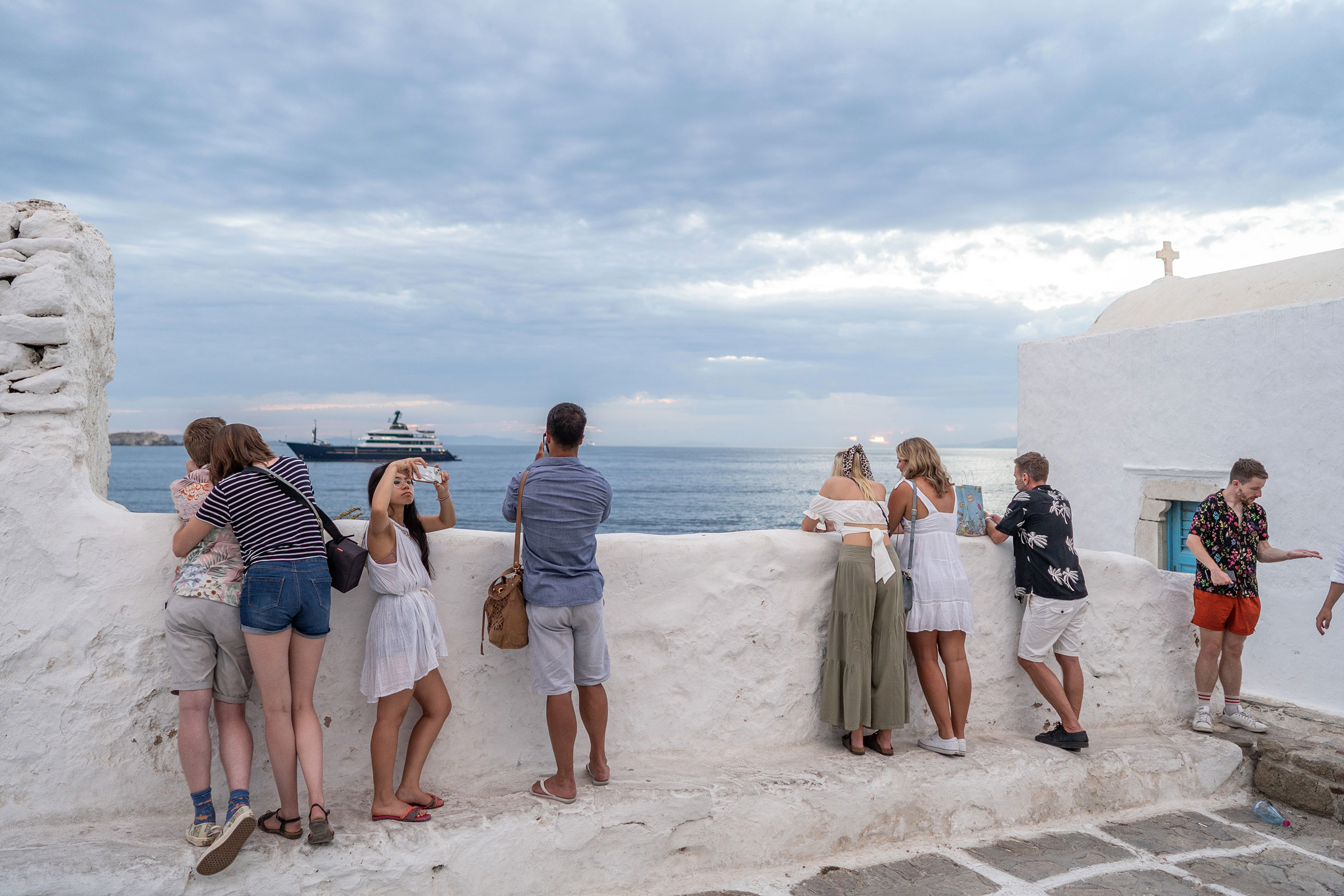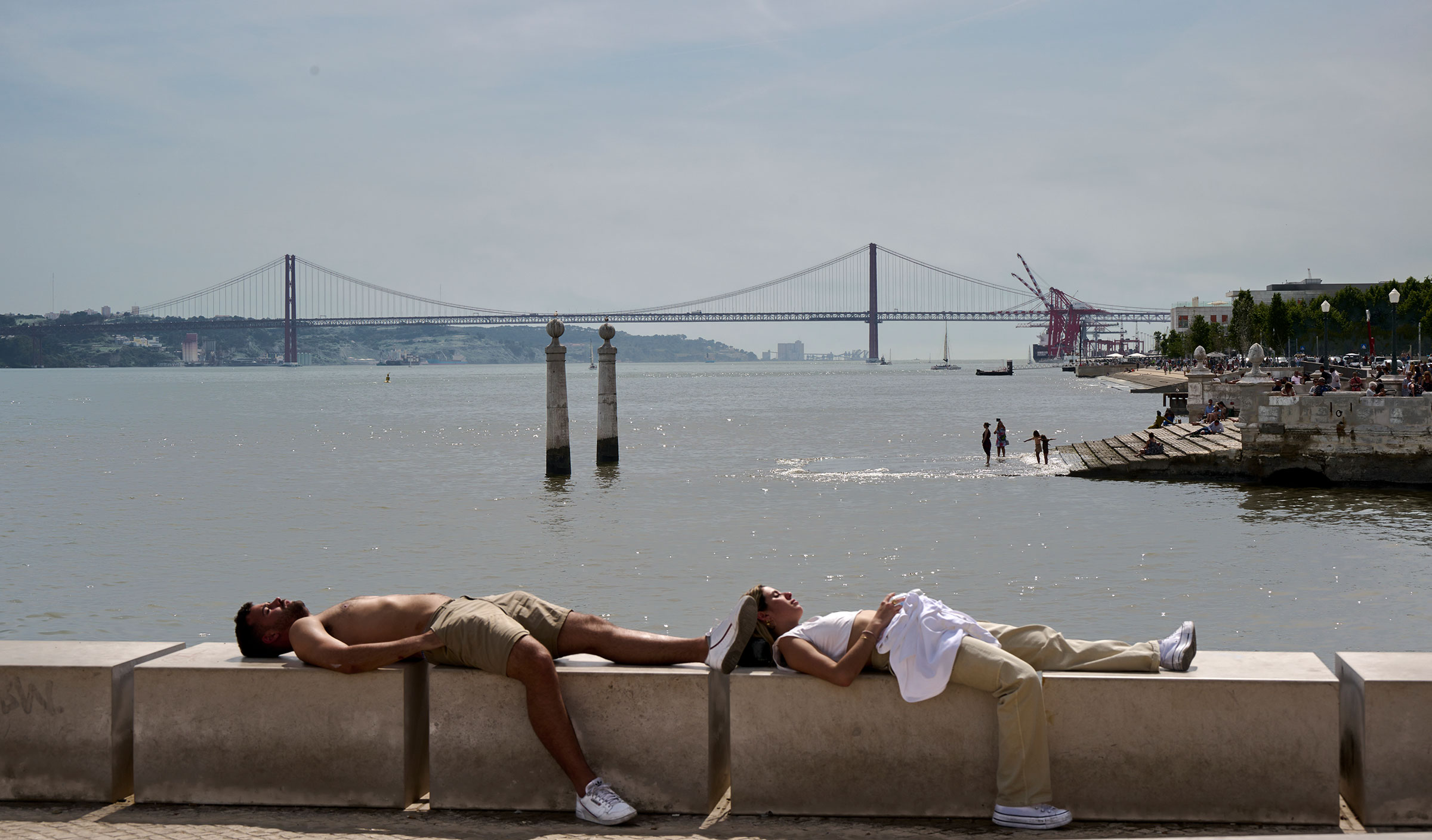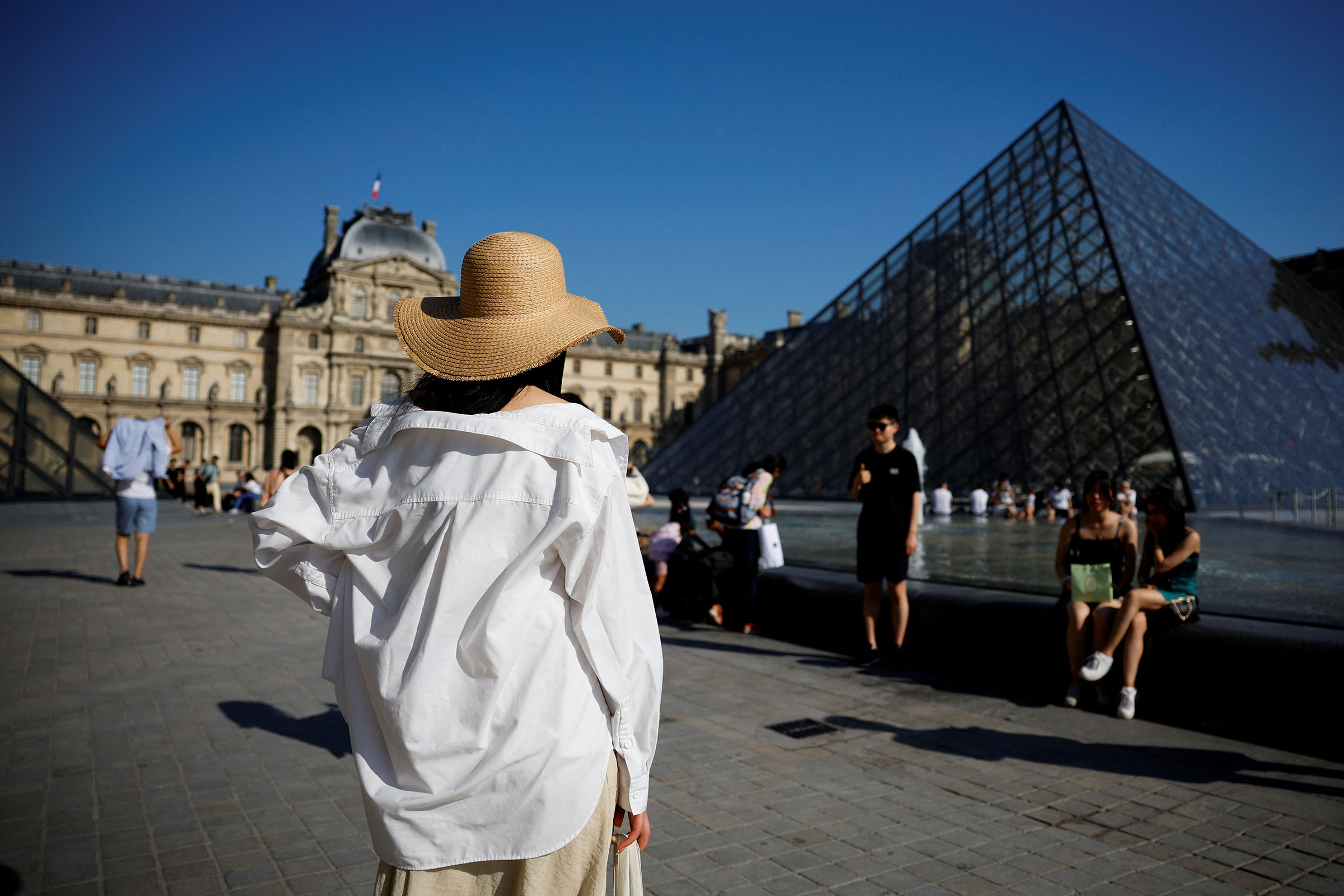The clock had not yet struck noon on a recent sunny day in Copenhagen, but the hour didn’t stop Hannah Jackson and her friends from ordering a bottle of Champagne. After the waiter at one of the outdoor restaurants that line the Danish capital’s colorful harbor popped the cork, the four women from Texas gleefully toasted to their European adventure. “This is my first trip in more than two years,” said Jackson, 32. “We are celebrating every moment we can.”
Because no phenomenon can be real until it can be hashtagged, the travel industry has been quick to brand the impulse driving Jackson and countless others this summer as “revenge travel.” Like revenge spending and even revenge bubble-tea drinking, the phrase refers to consumers’ increased willingness to cough up cash after 28 long months of lockdowns and restrictions. In travel’s case, that means a newly unbridled demand for vacations that are more frequent, more indulgent, and—more than anything—far from home. That demand got a boost on June 13 when the U.S. stopped requiring a negative COVID-19 test for entry. But as it rises to and even surpasses pre-pandemic levels, a host of challenges, from inflation to war to, yes, the lingering threat of COVID-19, casts a shadow on the rosy predictions of a rebound. Will this be the summer in which the travel industry does indeed get revenge on the pandemic? Or will its hopes be dashed once again?
Read More: Can Barcelona Fix Its Love-Hate Relationship With Tourists After the Pandemic?
“The truth is that tourism is rebounding very, very quickly,” says Luís Araújo, president of the European Travel Commission (ETC), which represents the continent’s national tourism organizations. “It’s quite impressive.”
At this juncture, revenge travel looks to be off to a good start. Among Europeans, 70% are planning vacation trips between now and November, according to an ETC survey. The numbers are almost as strong among Americans, with 65% planning leisure trips within the next six months according to MMGY Travel Intelligence, a global marketing and research company based in Kansas City. According to Mastercard, bookings on short and medium-haul flights have surpassed pre-pandemic levels. And travel searches for the first quarter of 2022 were above their 2019 levels, according to Google, while searches for passport appointments jumped 300% in the first three months of this year.

“Pent up demand is already delivering rapid growth,” says David Goodger, Europe director for Tourism Economics, a U.K.-based company that provides forecasting and analysis to the travel industry. It’s driven, he adds, “by excess savings accumulated during the period when people couldn’t spend or travel as usual.”
Those extra savings are affecting not only the amount of travel people are undertaking but the kind of travel as well. After decades of appealing to budget travelers with low-cost flights and party buses, many European destinations are emerging from the pandemic with a new emphasis on upscale travel. “A lot of enterprises, big and small, have spent the past two years renovating their facilities, upgrading, investing in their hospitality—adapting to the new needs of the customer,” says Araújo of the ETC. “We also see a lot of countries adjusting their communication to high-end travel.”
Certainly companies that specialize in high-end travel are experiencing a boom. At Black Tomato, a luxury tour company with headquarters in London, the interest in itineraries that have guests island hopping in Greece or bottling their own perfumes in Provence is at record levels. “Demand for Europe is insane right now,” says Brendan Drewniany, director of communications. “We’re advising our clients that if they want to go to specific destinations in Europe at this point they’re going to have to be pretty open-minded about alternatives.”

Drewniany says that travelers started planning for this summer early: the company had its best quarter ever at the end of 2021, and in the first quarter of 2022, its clients are spending on average 31% more per booking. “We’re seeing a lot more multi-destination trips, and a lot more multi-generational ones,” he says. “People are traveling to celebrate milestones, and they want to bring the grandparents now.”
And after all that time stuck at home with nothing to do except stream Netflix and tend their sourdough starters, travelers are eager for experiences. “I prefer to call it ‘liberation travel,’ rather than revenge travel,” Araújo says with a chuckle. “But there’s an increase in people wanting to stay in independent hotels, partly because they care about sustainability. And they’re looking for more authentic experiences as well.”
Katie Parla can testify to that. The author of several books on Italian food, she leads culinary tours in Rome, and has seen her bookings surge 200% in the last several months compared to the same period in 2019. “People are just so grateful to be having these experiences,” Parla says. “Often they’re doing trips that they had planned to do in 2020, so even then something is closed or things don’t go as planned, they’re tolerant and understanding. They’re just so happy to be there.”

But we have been here before. In fact, the notion of revenge travel first emerged ahead of the summer of 2021, when everyone thought the worst was over and the world would soon open up again. In many ways, it did. Domestic travel in many places surged to nearly 90% of its 2019 rates that summer, and, as MMGY senior analyst Leanne Hill points out, tourists spent unusually high amounts that were, she says, “largely revenge-travel oriented.” But slow vaccine rollouts and adoption rates, coupled with the slew of ever-changing travel restrictions and newly emerging virus variants ultimately stymied expectations. International tourism was down 67% in July 2021 over its rates that same month in 2019.
Read More: Flight Delayed or Canceled? Here’s What to Do
This time around, the obstacles to the fulfillment of travel fantasies, vengeful and otherwise, are less about the virus (all of the experts TIME consulted agreed that there was little tolerance for more lockdowns and restrictions) than other ills that have sprung up in its wake. “Inflation and staff shortages is the twin-headed monster threatening the travel recovery this summer,” says Tourism Economics’ Goodger.
Staffing shortages are cutting into service across Europe. Many hotels have responded by automating some aspects like check in, and trimming once routine benefits like daily room cleaning. Restaurants from Copenhagen to Madrid have cut their operating hours and, in some cases, shut down altogether. But perhaps nowhere is the impact of the shortage on travelers clearer than in the scenes of chaos emerging from airports across Europe and the United States: flight cancellations, long waits for baggage that frequently fails to appear altogether, excruciating lines through security. “Demand is ramping up much more quickly than businesses, having shed workers during the pandemic, have been able to recruit for,” says Goodger.

And although American travelers are, according to MMGY estimates, planning on spending an average of $600 more per trip than they did a year ago, it’s unclear, analyst Hill says, “whether that’s because of increased costs or overall willingness to spend more.” There are clear signs, she adds, inflation is definitely starting to bite. “We’re beginning to see travel intentions start to erode slightly, particularly among travelers making less than $100,000.” Those concerns are echoed among Europeans travelers, according to the ETC, which found that while only 7% of travelers expressed concern about inflation and costs affecting their vacations in 2021, 13% do so now. At the high end too, pricing is “definitely a real challenge,” says Black Tomato’s Drewniany. “Hotel properties are all still recouping and it’s not that they’re trying to be extortionist, but prices are definitely worse. So it’s a challenge to explain and translate that to clients.”
Read More: Air Travel Is Hell This Summer. And It Won’t Be Fixed Anytime Soon
The war in Ukraine is also having an impact, at least in countries close to the border that, although they may not be major destinations, had experienced tourism growth prior to the pandemic. “These countries are running as smoothly as in any other country, but we’ve seen that they’ve had a hard time getting that message across to travelers,” says Araújo, especially when compared to the rapidly rebounding Mediterranean area. Inside Europe, he adds, the recovery has “two velocities.”

All that, and the uncertainty of COVID-19 to boot. When the U.S. lifted the requirement of a negative test to enter the country on June 12, it spurred an immediate boomlet within the larger boom of American travel plans. One global tour operator Explore, saw a 12% increase in website traffic immediately following the news, according to MMGY. Within Europe, though, some countries still have some restrictions in place, and the lack of clarity has translated, according to the ETC, into a weaker resurgence of long-haul flights to Europe, including from the US; those numbers are not expected to return to 2019 levels until 2024.
Even so, most industry insiders are feeling optimistic about the summer ahead of them. And even more than revenge, that may be due to another pandemic-generated emotion: resilience. “You hear things like, oh, people are valuing experiences over Rolexes, and I think that is the reality right now: people are putting their money into experiences,” says Drewniany. But, he adds, there’s something else in play. “After everything everyone’s been through, there’s not a ton of fear about the unknown anymore. People know that if they’re scheduled to go to London in October and for some reason, London locks down or something, they know that we’ll figure it out. What you’re seeing renewed right now is this sort of inherent mindset of flexibility.”
More Must-Reads From TIME
- The 100 Most Influential People of 2024
- How Far Trump Would Go
- Scenes From Pro-Palestinian Encampments Across U.S. Universities
- Saving Seconds Is Better Than Hours
- Why Your Breakfast Should Start with a Vegetable
- 6 Compliments That Land Every Time
- Welcome to the Golden Age of Ryan Gosling
- Want Weekly Recs on What to Watch, Read, and More? Sign Up for Worth Your Time
Contact us at letters@time.com